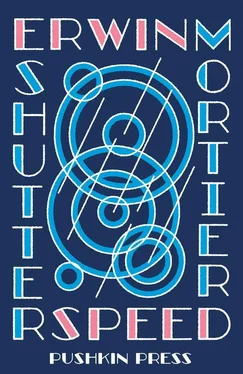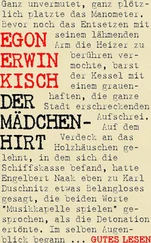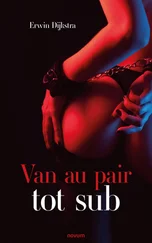Some said it was written all over her. She was a Van Callant and no mistake. Miss van Vooren thought so, too. At some point the poor kid must have got wind of what was being said behind her back. You could tell by the way she rode her bike: so hunched over that her back was practically parallel to the road surface and her head bent low over the grotesque shopping bag swinging from the handlebar.
*
When the bell finished striking nine there was a rattling sound on the other side of the sacristy door, and the boys stopped talking. The door opened and Miss van Vooren greeted us with ‘How nice, the disciples have arrived.’ She was trying to sound casual.
She wore her usual outfit for special occasions: navy blue coat and skirt, flat shoes, milky nylon stockings and a blouse with an enormous bow. She had clearly been to the hairdresser: her head looked twice its normal size.
For two days running she had told Aunt she was sorry but she couldn’t stop because she had an appointment at the salon, as though the sanctification of her tresses had to be undertaken in stages, or they would not stand erect as a finely meshed helmet of individually lacquered hairs.
Miss van Vooren let us into the sacristy. The priest was leaning against the wardrobe, practising his sermon. He nodded curtly, without taking further notice of us.
In a while he would be pontificating about the church being like a vessel tossed on an ocean of green meadows, a shipload of Christians on the high seas of time, and he would cite the apostles during the storm at the Sea of Galilee.
Not being an inventive preacher, he came out with the same sermon each year, but his dramatic delivery, complete with flailing elbows and shaking knees, was so convincing that half the congregation would be affected by seasickness.
Propped against the wall, between the clock and the window, was the canopy: a square of white damask brocaded with gold thread, hanging slackly between carrying-poles of dark wood.
‘It’s not as difficult as it looks,’ Miss van Vooren assured me. ‘The main thing is to keep in step with the others, and to carry your pole at the same height … Right, I’ll get the clothes.’
She inspected the three wide drawers in the lower half of the sacristy closet. Lying in the bottom one were the white vestments with lace borders and a bunch of crimson cords that served as belts.
‘Arms up,’ ordered Miss van Vooren, turning to me. The others were left to put on their albs themselves, which they did with girlish enthusiasm. Miss van Vooren obviously thought I could not manage without her assistance.
‘Put your hands together …’ She had to stand up on tiptoe to pass the canvas sling over my shoulders, for I was already taller than her.
‘A wee bit too long for you,’ she remarked, eyeing my alb. ‘But we can make it shorter, like this.’ She tied one of the crimson cords round my waist.
‘Rosa …’ called the priest from the other end of the sacristy. ‘Can you spare me a moment? I’ve got my head stuck in the sleeves again.’ He was swaddled in fabric from the waist up.
‘Just a second,’ she replied, rolling up my sleeves. Then she turned away to help the priest.
It was some time before his head, flushed purple from exertion, emerged from his surplice.
The boys tried to stifle their sniggers.
‘Quite the glamour puss in that get-up, aren’t you,’ said the tall boy, confronting the shortest of the trio. ‘I might even fancy you myself …’
‘Look a bit of all right, do I?’ smirked the short boy, wiggling his hips and lifting his lacy hem between thumb and forefinger.
‘Confound all these trappings,’ grumbled the priest. ‘Imagine if Our Lord had been obliged to get all togged up every time he opened his mouth. He’d have stayed in Nazareth, I wager … Wouldn’t blame him, either. Spot of sawing, bit of joinery — good honest work.’
Out in the chancel the regular altar boys busied themselves with the liturgical vessels. Up in the rood loft the schoolmaster played the opening chords of As the hart panteth after the water brooks, so panteth my soul after thee, O God .
‘Now boys! Stop that nonsense and go and sit in the stalls, over there,’ she said, indicating the far side of the high choir.
‘The youngest first,’ she called after us, ‘and in an orderly fashion, please.’
The church was filling up. Over half the seats were already taken, and still the door in the entrance kept creaking open and shut with new arrivals.
Over by the communion rail were the chairs upholstered in wine-red velour, the preserve of the gentry since time immemorial. I noted Hélène Vuylsteke seating herself on one of them. She removed her hat, crossed herself, and knelt.
She was alone. Perhaps her charge was still asleep in bed. Perhaps the child simply didn’t fancy attending Mass. It had been years since a Van Callant occupied a seat in the premier section of this house of worship, where the sunbeams seeping through the stained-glass windows reassembled into the family coat of arms on the flagstones. The noble family had donated confession boxes, processional banners, incense burners and the occasional relic, they had contributed land to the almshouses and riches to the church treasury. Even the wainscoting at my back was carved with their old battle-cry ‘Groeninghe Velt! Groeninghe Velt!’
Above my head Saint Paul leaned heavily on his sword. On top of the choir stalls across the way stood Saint Peter, displaying the keys of heaven to the congregation while a ribbon of incense curled up round his feet. Two of the regular boys were blowing on the censer behind the high altar.
Uncle Werner and Aunt Laura, having opted as usual for a seat neither at the front nor at the back, were halfway down the nave, under the lee of the pulpit. Uncle waved at me, but I pretended not to see him.
It was half-past nine. Miss van Vooren pulled a handle next to the sacristy door; a bell tinkled across the chancel.
Up in the rood loft the choir launched into God is gone up with a shout, the Lord with the sound of a trumpet . The priest emerged from the sacristy attended by his acolytes. They gathered a few paces short of the high altar, genuflected, then moved up close to the tabernacle and genuflected again.
I slumped against the back of my seat. All around me the service was unfurling in a panoply of dance, a continuous choreography of outspread arms, bowed heads and incantations that had been going on since goodness knows when, in this very place. Well before the existence of the big house, that was certain, well before there had been battlements rising in the distance beyond the roofs of the village, according to Mr Snellaert.
This was to be the last time I was able to lose myself in historical musings at will, just as easily becoming someone else by wrapping myself in an old curtain from the dressing-up trunk in the attic — but I didn’t know that then.
The incense was getting to me, and I tried not to look too groggy. Miss van Vooren stood by the door to the sacristy throughout, watching our every move.
The choir sang We have a strong city: salvation will God appoint for walls and bulwarks . The altar boys escorted the priest to the pulpit. The congregation rose from their knees and sat down.
Hélène Vuylsteke exchanged her kneeler for one of the comfortable chairs, but not the tall one which was traditionally reserved for the lord of the manor.
From on high the priest announced to his flock that the contents of this week’s collection box would go to the Papal Mission Association. Then he embarked on his sermon, and within two minutes the nave of the church was rolling amid green meadows, much as the disciples had done on the choppy Sea of Galilee when the Saviour walked on water to save them.
Читать дальше












